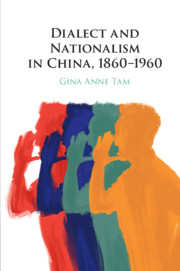Book contents
- Dialect and Nationalism in China, 1860–1960
- Dialect and Nationalism in China, 1860–1960
- Copyright page
- Dedication
- Contents
- Figures
- Acknowledgments
- A Note on Romanization and Characters
- Introduction
- 1 A Chinese Language
- 2 Unchangeable Roots
- 3 The Science of Language in Republican China
- 4 The People’s Language
- 5 The Mandarin Revolution
- Epilogue
- Works Cited
- Index
3 - The Science of Language in Republican China
Published online by Cambridge University Press: 28 February 2020
- Dialect and Nationalism in China, 1860–1960
- Dialect and Nationalism in China, 1860–1960
- Copyright page
- Dedication
- Contents
- Figures
- Acknowledgments
- A Note on Romanization and Characters
- Introduction
- 1 A Chinese Language
- 2 Unchangeable Roots
- 3 The Science of Language in Republican China
- 4 The People’s Language
- 5 The Mandarin Revolution
- Epilogue
- Works Cited
- Index
Summary
Moving from politics in the early Republic to the academy, Chapter 3 argues that the emergence of the intertwined fields of folksong studies, dialectology, and ethnography after the 1919 May Fourth movement each suggested a distinct role for fangyan in China’s national invention - of, respectively, a medium to express authentic emotion, of subsidiaries to the national language, and as representative of a Han ethnicity. Folksong collectors sought to immortalize the oral culture of China’s countryside, thereby designating fangyan the nation’s culture authentically rendered. Linguists inspired by Western comparative linguistics sought to organize China’s languages into hierarchical taxonomies. Ethnographers juxtaposed fangyan surveys with research on Chinese ethnic minorities, in order to draw strict boundaries between the Han and China’s other ethnic groups. Together, these three disciplines set the terms for debate over the cultural and social roles of fangyan in policy, education, and art.
Keywords
- Type
- Chapter
- Information
- Dialect and Nationalism in China, 1860–1960 , pp. 111 - 146Publisher: Cambridge University PressPrint publication year: 2020

